CEC hits the nail on the head, but the wrong nail

"Democracy will die if people don't vote." This is a very powerful statement from Chief Election Commissioner (CEC) Kazi Habibul Awal. He further said, "If democracy and its spirit are to be kept alive, voters will have to come to the polling stations. If they refuse to come to the polling stations and vote, it will be understood that the country's democracy is sick and will have an unnatural death." The CEC has hit the nail on the head. The hitting is okay. But it is the wrong nail.
The CEC appears to put the onus of protecting democracy only on the voters, and the message is that if voters don't vote, then our democracy will have, in his words, "an unnatural death." What is the CEC's warning based on? Why does he fear that voters may shun the coming election? Is it voters' apathy – of which there was some evidence in the UP elections – or something else? Could it be the role of the Election Commission (EC) itself?
National elections' voter turnout records prove that our people have always been aware of their duties and turned out in significant numbers to exercise their franchise. Not counting the ones under the military regimes – where the turnouts were nearly 60 percent – in the elections held after the fall of Gen Ershad, meaning from 1991 onwards, the turnouts were more impressive. From 2001 onwards, it reached 75 percent and above, with the election of 2008 – which brought the present ruling party and the present prime minister to power – reaching the highest ever turnout of 87.13 percent.
So why is the CEC worried about voter turnout in the national election due in 2023 when, as records show, our voters are always eager and willing to go to polls? The answer lies in the workings of the last two elections – in 2014 and 2018 – and the way public trust has all but disappeared from the process, thanks to the role of the last two ECs and their respective heads (CECs).

In the 2014 election, candidates in 153 constituencies were declared "elected" without a single vote cast. The reason given was that there was only one candidate per constituency, and, as such, there was no reason to hold an election. As for the 2018 election, the popular belief is that voting took place the night before.
Let us examine these two cases. In 2014, as stated earlier, out of a total of 300 constituencies (not counting the reserved seats for women, which are elected indirectly), 153 MPs were declared "elected" uncontested by the EC.
Only one candidate per constituency is unprecedented and totally contrary to the election tradition in Bangladesh. Even candidates who have no chance to win contest in the polls because, through the process, they gain social recognition and some importance.
Why didn't this statistically impossible and historically improbable figure not trigger any question in the minds of the EC? Did they ask whether candidates were compelled to withdraw from the race or whether any force was used to make this happen? A cursory examination would have revealed that there was a sudden flood of nomination withdrawal at the last moment.
Didn't the EC realise that 153 MPs so "elected" constituted a majority in a parliament of 300 seats, and, as such, this group, in support of whom not a single vote was cast, had the majority of forming the government? By certifying this group, didn't the EC encourage similar forcible withdrawal of candidature to ensure uncontested wins in the future? We are seeing the evidence of it in many UP chairmen elections.
The 153 uncontested winners in 2014 was in stark contrast to the fact that in 1991, 1996 (June), 2001 and 2008 elections, there was NOT A SINGLE uncontested "winner," according to the EC's own reports. From zero seats to 153 seats, and the EC did not blink an eye in certifying it.
Then there is the election of 2018, where there were clear indications that the whole phenomenon was usurped and the voting process totally subverted. The ruling party MPs lamented in private – especially those who performed well, had a long tradition of service, and felt confident to carry their constituencies – about the way the process was taken over by "institutions." When asked by the MPs confident of winning, "Sir, we cannot take any chance" was the usual reply.
Then there were numerous by-elections where the EC was publicly seen to overlook blatant violations of the electoral rules by the ruling party candidates and their supporters. We saw some recent instances, too, which significantly maligned the image of the current EC.
Starting from 2014, over the years, and especially following the 2018 elections and several by-elections, the EC has lost its credibility and public confidence.
If voters refrain from going to the next polls, scheduled for late 2023 or early 2024, it will not be because they lack the interest, knowledge and understanding of the importance of exercising their franchise, but because of the lack of confidence in the central body that conducts the whole process – the Election Commission.

Our clear message to the CEC is: You restore public faith in the institution you lead, and voters will flock to the polls on their own. Your worry need not be focused on the voters, but your own institution. Fix it, and we will have the best of elections.
But the crucial question is: Can you fix the institution that you head? Regrettably, your predecessors – I am leaving out those who operated under caretaker governments – have not left you any legacy of dignity and honour. Theirs is a legacy of constant genuflecting before power.
The CEC, along with other members of the EC, is now conducting dialogues with political parties on how to hold a free and fair election, to which the CEC has pledged his total commitment. The first question that people are asking is: How much power and willingness does the EC have to implement these recommendations – even a few select ones? The general impression is none, and hence the whole dialogue process takes the hue of a farce.
How empowered is the Election Commission? Much depends on how the commission sees its own mandate. The constitution envisages the "people" as the "source of all power," and the expression of people's "will" as the only legitimate process of governance. Free and fair elections are the best process of expressing that "will," and the EC is fully and primarily responsible for ensuring that. Thus, the EC's role touches the very core of our existence as a democratic entity.
The EC's constitutional, legal and moral mandate is to ensure a free and fair election.
The Appellate Division has indicated the inherent power of the EC to ensure it. According to Constitutional Law of Bangladesh by Mahmudul Islam, the book considered to be the most authoritative on the subject, "The constitution does not envisage anything else than a free and fair election and any law that will stifle the hands of the Commission in ensuring free and fair election will not pass the test of constitutionality… The Commission has to supervise, control and direct each and every step of the process to ensure free and fair election and the Commission must deem to have all the power and discretion to ensure free and fair election as that is the manifest intendment of the Constitution in providing for the Commission." (Third edition, Pages 970-974). Nothing could be clearer about the constitutional mandate of the EC to deliver a free and fair election. What more power does the EC need to discharge its obligation?
The ultimate question is: Will the CEC and his EC serve to express the WILL of the people or that of the powers that be? The former will lead to the strengthening of democracy, and the latter will lead to, in his own words, its "unnatural death."
More starkly put, will the EC be an "event manager" or a "democracy strengthener"?
Mahfuz Anam is the editor and publisher of The Daily Star.

 For all latest news, follow The Daily Star's Google News channel.
For all latest news, follow The Daily Star's Google News channel. 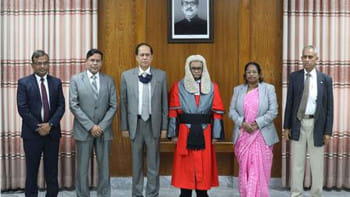
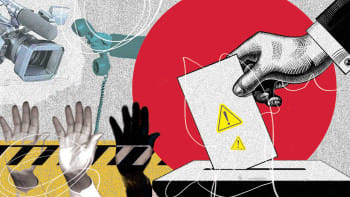





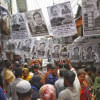
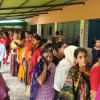
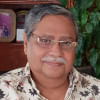


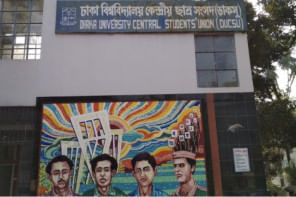
Comments